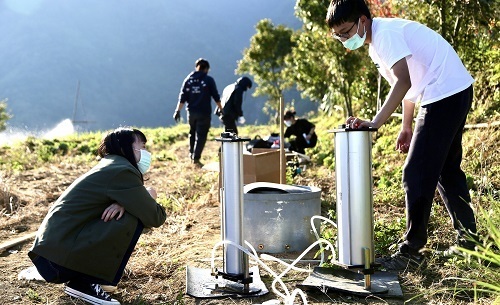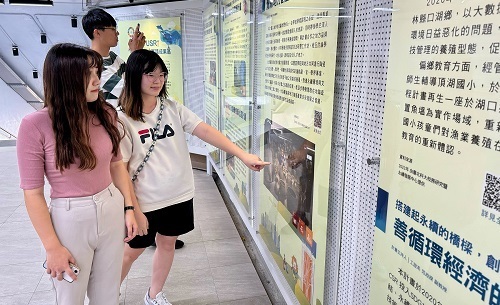Taipei Tech Holds Sustainability Exhibition, Features the Yehliu Coastal Landscape Preservation Project


Taipei Tech took part in the Yehliu Coastal Landscape Preservation and Fishing Village Cultural Sustainability Project as part of the school’s university social responsibility (USR) outreach program. The program involved faculty members and students from various fields including material sciences, resource engineering, civil engineering, environmental engineering, and cultural development. One of the aims of the project was to strengthen the mushroom rock structures along the Yehliu coast using the sandstone reinforcement techniques. Another project goal was to transform pumice, a type of floating volcanic rock that is typically harmful to the environment, into usable resources. Plans were also devised to revitalize local fishing village culture to attract young people to assist in preserving precious natural landscapes. This preservation initiate ultimately seeks to enhance the international tourism appeal of the area through sustainable thinking, and the documentation of the process is currently being showcased at Taipei Tech’s SDGs × USR Achievement Exhibition - Sustainable WeCan.
Vice President Thomas C.K. Yang highlighted Taipei Tech’s commitment to global sustainability trends such as net zero transformation, underscoring the faculty's extensive contribution of 555 research papers on sustainability topics in international journals in 2022. These papers mainly focus on three of UN’s Sustainable Development Goals (SDGs): affordable and clean energy; good health and well-being; and industry, innovation and infrastructure. Taipei Tech’s active fieldwork efforts in areas such as Wanli, Yingge, Fengyuan, Houtong, and Quri Tribe also demonstrates the school’s dedication in the preservation of cultural heritage and traditional craftsman skills.
Director of Secretariate Wu Chien-Wen discussed the establishment of the Institutional Research and Sustainability Development Center last year. The center sets goals in water conservation, energy saving, carbon reduction, and zero waste for the university and tracks progress. Highlighting sustainable research advancements, Wu mentioned a notable project led by Professor Lee Kuei-Peng from the Department of Energy and Refrigerating Air-Conditioning Engineering. This project focused on improving air curtain efficiency in semi-open business spaces such as convenience stores, banks, and restaurants. It was commissioned by the Energy Administration at the Ministry of Economic Affairs and the Taiwan Green Productivity Foundation, resulting in the Handbook of Energy-Saving via Air Curtains in Service Industry Business Places.
Additionally, to address the intermittent power supply drawback of solar power generation, Professor Huang Ming-Hsi and his team from the Department of Electrical Engineering developed a power grid-connected energy converter that facilitates the integration of direct current from lithium batteries with alternating current grid and vice versa. The converter enables flexibility of energy source during peak hours and thus reducing supply pressure on the grid. During power outages, the converter can also supply electricity for critical equipment such as food refrigeration and long-term care instruments. This innovation, produced through industry-academia collaboration, won the Taiwan Excellence Award last year and is marketed globally.
Moreover, Professor Walter Chen from the Department of Civil Engineering led the Project to Apply Eco-friendly Slope Stabilization at Quri Tribe. Chen and a team of students introduced modern soil and water disaster prevention techniques into the tribe’s traditional natural farming methods. They also suggested strategies to prevent rockfalls and promote vegetation and soil conservation that aim at soil erosion reduction and biodiversity maintenance, resulting in a sustainable approach to agriculture within the community.
Vice President Thomas C.K. Yang highlighted Taipei Tech’s commitment to global sustainability trends such as net zero transformation, underscoring the faculty's extensive contribution of 555 research papers on sustainability topics in international journals in 2022. These papers mainly focus on three of UN’s Sustainable Development Goals (SDGs): affordable and clean energy; good health and well-being; and industry, innovation and infrastructure. Taipei Tech’s active fieldwork efforts in areas such as Wanli, Yingge, Fengyuan, Houtong, and Quri Tribe also demonstrates the school’s dedication in the preservation of cultural heritage and traditional craftsman skills.
Director of Secretariate Wu Chien-Wen discussed the establishment of the Institutional Research and Sustainability Development Center last year. The center sets goals in water conservation, energy saving, carbon reduction, and zero waste for the university and tracks progress. Highlighting sustainable research advancements, Wu mentioned a notable project led by Professor Lee Kuei-Peng from the Department of Energy and Refrigerating Air-Conditioning Engineering. This project focused on improving air curtain efficiency in semi-open business spaces such as convenience stores, banks, and restaurants. It was commissioned by the Energy Administration at the Ministry of Economic Affairs and the Taiwan Green Productivity Foundation, resulting in the Handbook of Energy-Saving via Air Curtains in Service Industry Business Places.
Additionally, to address the intermittent power supply drawback of solar power generation, Professor Huang Ming-Hsi and his team from the Department of Electrical Engineering developed a power grid-connected energy converter that facilitates the integration of direct current from lithium batteries with alternating current grid and vice versa. The converter enables flexibility of energy source during peak hours and thus reducing supply pressure on the grid. During power outages, the converter can also supply electricity for critical equipment such as food refrigeration and long-term care instruments. This innovation, produced through industry-academia collaboration, won the Taiwan Excellence Award last year and is marketed globally.
Moreover, Professor Walter Chen from the Department of Civil Engineering led the Project to Apply Eco-friendly Slope Stabilization at Quri Tribe. Chen and a team of students introduced modern soil and water disaster prevention techniques into the tribe’s traditional natural farming methods. They also suggested strategies to prevent rockfalls and promote vegetation and soil conservation that aim at soil erosion reduction and biodiversity maintenance, resulting in a sustainable approach to agriculture within the community.